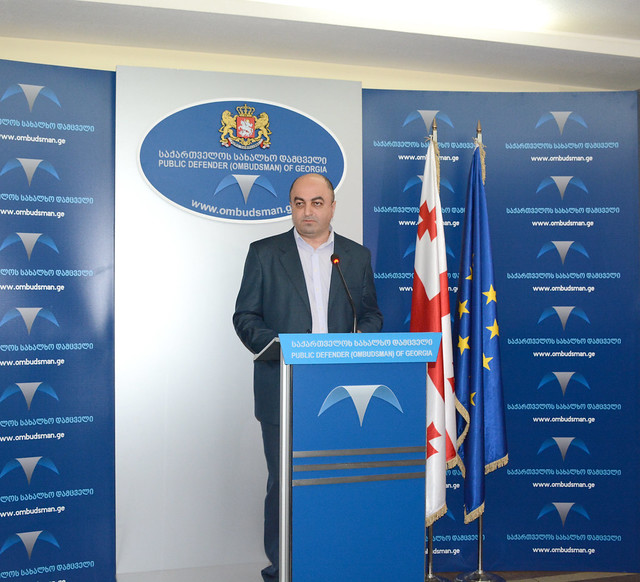Public Defender Releases Statement regarding Parliament's Resolution on Public Defender’s Report 2015
The Parliament of Georgia listened to the Public Defender's annual report on the situation of human rights and freedoms at the plenary session on 24 June 2016. As a result, the legislative body adopted a resolution in which it included a number of recommendations of the Public Defender.
It is welcome that in recent years the Parliament’s Human Rights and Civil Integration Committee has established high standards of reviewing of and responding to the Public Defender's annual reports.
It should be noted that the number of accepted recommendations has been substantially increased this year compared to previous years, though, unfortunately, the resolution does not take into view the most important recommendations of the Public Defender, which aim at eliminating systemic acute problems.
The Parliament did not agree with the Public Defender’s recommendation on creation of a labor inspection mechanism which would be responsible for monitoring of protection of labor rights. This had been a subject of a number of Public Defender’s recommendations in recent years.
Unfortunately, the resolution does not consider improvement of legislation in a number of directions; in particular, making necessary amendments to relevant laws for elimination of discrimination and establishment of equality, which is a real obstacle to effective implementation and monitoring of anti-discrimination legislation. Although the bill was adopted in the first reading by the Human Rights and Civil Integration Committee, its further consideration is delayed.
The resolution makes no mention of timely initiation of a new bill on freedom of information, under which a mechanism is to be created for ensuring access to information and monitoring of freedom of information. The document does not include a recommendation on revision of certain regulations of the Law on Development of the Mountainous Regions or the recommendations on the necessity for timely adoption of the law on eco-migrants, stiffening of the rules for tobacco control or introduction of rules for legal regulation of electronic distribution of cases in common courts. Unfortunately, amendments to the Organic Law on Common Courts, which provide for the introduction of the rule, were adopted by the Parliament only in two readings. Accordingly, completion of the third-wave reform of the justice system is still delayed. The Parliament did not agree with the recommendation on introduction of ethic norms and creation of its implementation mechanism for regulation of the activities of Members of Parliament and local government officials. The resolution does not include a recommendation on creation of a special temporary mechanism of quota system, which was recommended by the Committee on the Elimination of All Forms of Discrimination against Women.
Despite repeated appeals, results of criminal investigation into high-profile cases mentioned in the Public Defender’s parliamentary reports 2013-2014 are still unknown.
The recommendations considered by the Parliament include creation of a temporary fact-finding commission with regard to the events developed in the village of Lapankuri, Lopota Gorge, and completion of investigation of hatred/intolerance-motivated crimes. Despite repeated appeals, results of the official investigation ongoing into the Lapankuri case are still unknown.
The resolution does not include the recommendation on provision of information to the public with regard to the investigation of the release of video footage showing personal life on March 11 and 14, 2016, and quick identification of perpetrators. The resolution makes no mention of timely and effective investigation of violent acts committed against offices and members of the United National Movement Party, including MPs.
The resolution does not include the Public Defender’s recommendations on: the launch of timely, effective, objective and impartial investigation into the reports spread about the illegal activities of the ODR system (ODR is a Russian abbreviation that stands for ‘Acting Reserve Officer’, a person inculcated into an institution and acting on behalf of the secret police); creation of a temporary fact-finding commission to study how the so-called ODR system is used after enactment of new legislative regulations in the agencies where its operation is banned by law.
Like in previous years, the Public Defender’s recommendation remains unchanged with regard to the closure of the high risk prison N7.
The Parliament of Georgia did not agree with the Public Defender’s recommendation on keeping video surveillance records in the prison system for a reasonable period of time - at least 10 days, which is one of the necessary mechanisms of fight against torture and ill-treatment. The resolution indicates that a reasonable period for retention of records is at least 24 hours, which is a current legislative regulation that cannot ensure effective safeguards for victims of torture and ill-treatment.
It should be noted that the Parliament took into view the recommendation on creation of an independent investigative mechanism, although the resolution does not identify a state agency responsible for implementing the recommendation and therefore, it is unclear how the fulfillment of the recommendation and its monitoring will be ensured. The necessity for implementation of the recommendations as soon as possible is evidenced by the fact that institutional independence of investigations into alleged torture, inhuman and degrading treatment committed by law enforcers and in the penitentiary system remained a problem in 2015.
The Parliament’s resolution indicates that the Parliament of Georgia demands more in-depth analyses in the Public Defender’s annual reports. In response to this, the Public Defender stated at the plenary session that, in accordance with the Organic Law on the Public Defender, the 1260-page report describes in detail the human rights situation in the country based on the in-depth analysis of the efforts carried out by the Public Defender in the reporting period and clearly shows the positive and negative trends revealed in the field of human rights.
The Public Defender hopes that in the future, together with the establishment of the new practice of parliamentary review of annual reports, recommendations on the eradication of systemic problems will be taken into view, which is vital for improving the situation of human rights and freedoms in the country.
















